Serving 4 students in grades 9-12, Pcjted - Tucson High School ranks in the bottom 50% of all schools in Arizona for overall test scores (math proficiency is bottom 50%, and reading proficiency is bottom 50%).
The percentage of students achieving proficiency in math is 40% (which is lower than the Arizona state average of 45%). The percentage of students achieving proficiency in reading/language arts is 35% (which is lower than the Arizona state average of 45%).
Quick Stats (2025)
- School Type: Vocational school
- Grades: 9-12
- Enrollment: 4 students
- Graduation Rate: <50%
- Math Proficiency: 40% (Top 1% in AZ)
- Reading Proficiency: 35% (Top 1%)
- Source: National Center for Education Statistics (NCES), AZ Dept. of Education
Top Rankings
Pcjted - Tucson High School ranks among the top 20% of public schools in Arizona for:
Category
Attribute
Community Size
School Overview
Pcjted - Tucson High School's student population of 4 students has grown by 300% over five school years.
School Type
Grades Offered
Grades 9-12
Total Students
4 students
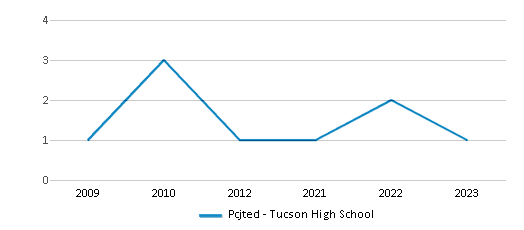
Gender %
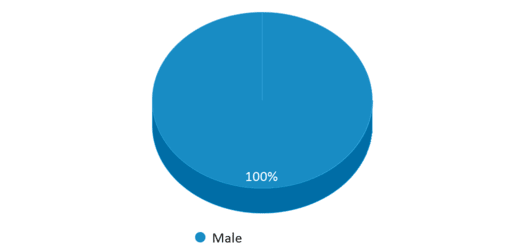
Total Classroom Teachers
n/a
Students by Grade
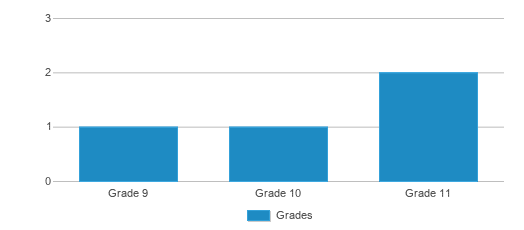
School Calendar
School Rankings
The diversity score of Pcjted - Tucson High School is 0.00, which is less than the diversity score at state average of 0.66. The school's diversity has stayed relatively flat over five school years.
Math Test Scores (% Proficient)
(18-19)40%
45%
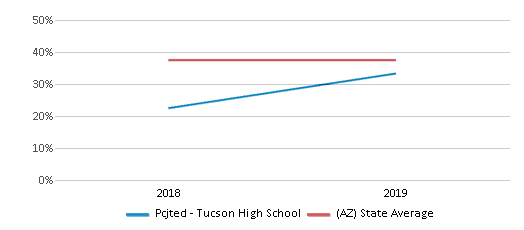
Reading/Language Arts Test Scores (% Proficient)
(18-19)35%
45%
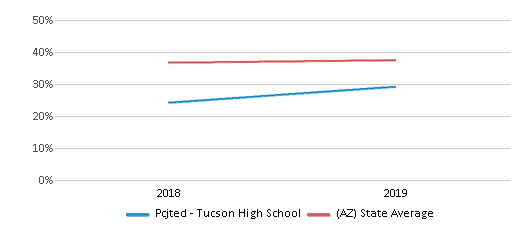
Student : Teacher Ratio
n/a
17:1
American Indian
n/a
5%
Asian
n/a
3%
Hispanic
100%
48%
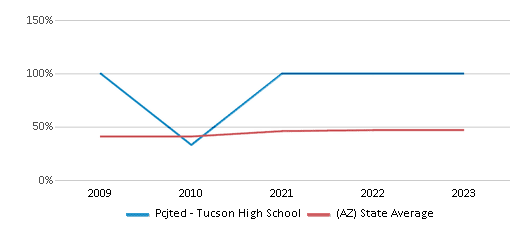
Black
n/a
6%
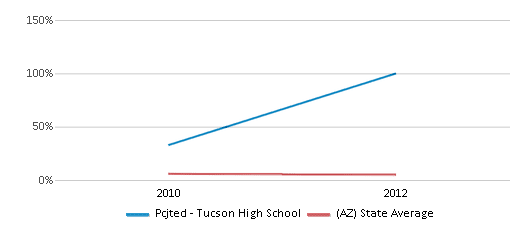
White
n/a
34%
Hawaiian
n/a
n/a
Two or more races
n/a
4%
All Ethnic Groups
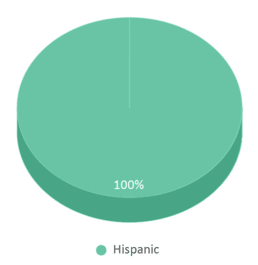
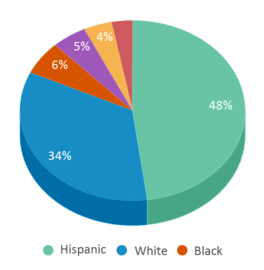
Graduation Rate
(18-19)<50%
78%
School Statewide Testing
School District Name
Source: National Center for Education Statistics (NCES), AZ Dept. of Education
Profile last updated: 02/09/2025
Frequently Asked Questions
What percent of students have achieved state testing proficiency in math and reading?
40% of students have achieved math proficiency (compared to the 45% AZ state average), while 35% of students have achieved reading proficiency (compared to the 45% AZ state average).
What is the graduation rate of Pcjted - Tucson High School?
The graduation rate of Pcjted - Tucson High School is 50%, which is lower than the Arizona state average of 78%.
How many students attend Pcjted - Tucson High School?
4 students attend Pcjted - Tucson High School.
What is the racial composition of the student body?
100% of Pcjted - Tucson High School students are Hispanic.
What grades does Pcjted - Tucson High School offer ?
Pcjted - Tucson High School offers enrollment in grades 9-12
What school district is Pcjted - Tucson High School part of?
Pcjted - Tucson High School is part of Pima County JTED (89380) School District.
In what neighborhood is Pcjted - Tucson High School located?
Pcjted - Tucson High School is located in the Pie Allen neighborhood of Tucson, AZ. There are 1 other public schools located in Pie Allen.
School Reviews
Review Pcjted - Tucson High School. Reviews should be a few sentences in length. Please include any comments on:
- Quality of academic programs, teachers, and facilities
- Availability of music, art, sports and other extracurricular activities
Recent Articles

Sexual Harassment at Age 6: The Tale of a First Grade Suspension
A six-year old in Aurora, Colorado, was suspended after singing an LMFAO song to a little girl in his class and reportedly “shaking his booty.” We look at the case and the sexual harassment problem in public schools today.

How Scaffolding Could Change the Way Your Child Learns
This article explores the concept of instructional scaffolding, a teaching method that enhances learning by breaking down complex tasks into manageable parts. It highlights how scaffolding supports students in developing critical thinking skills and becoming more independent learners. The article discusses the benefits of scaffolding, including improved engagement and reduced anxiety, and provides strategies for its implementation across various educational levels.

February 05, 2025
Understanding the U.S. Department of Education: Structure, Impact, and EvolutionWe explore how the Department of Education shapes American education, from its cabinet-level leadership to its impact on millions of students, written for general audiences seeking clarity on this vital institution.





